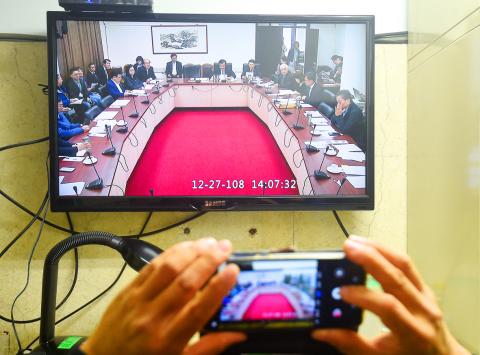The first round of cross-caucus negotiations on an anti-infiltration bill yesterday yielded few results after lawmakers failed to agree on the wording of a draft article.
Despite the Legislative Yuan being in recess, Legislative Speaker Su Jia-chyuan (蘇嘉全) called for the talks ahead of a final review scheduled for Tuesday next week.
Article 1 of the draft legislation reads: “This act was drafted to prevent intervention and infiltration by external hostile forces to ensure national and social security, as well as to uphold the nation’s sovereignty and democratic and constitutional institutions.”

Photo: Liao Chen-huei, Taipei Times
People First Party caucus whip Lee Hung-chun (李鴻鈞) asked why the article says: “external hostile forces,” instead of “external forces.”
The US and Japan are not hostile, but could also pose threats to the nation in terms of commerce, as could the Philippines, whose forces in 2013 fired on a Taiwanese fishing vessel, he said.
Mainland Affairs Council Minister Chen Ming-tong (陳明通) said that the countries Lee mentioned do not plan to infiltrate Taiwan; undermine its democratic and constitutional institutions; engage in a military confrontation with the nation; seek to eliminate it by force; or endanger its sovereignty through non-peaceful means, and are therefore not the subjects of the bill.
The Chinese Nationalist Party (KMT) caucus said that “the nation’s sovereignty” should be changed to “the sovereignty of the Republic of China.”
Democratic Progressive Party (DPP) caucus whip Ker Chien-ming (柯建銘) said that motions related to the article should be deliberated further at Tuesday’s legislative meeting.
The DPP caucus then proposed altering Article 2, which includes groups, organizations and agencies “supervised by” the government, affiliated organizations or any intermediary of an external hostile force.
The wording “supervised by” should be removed, as the Chinese Communist Party (CCP) assigns “secretaries” at larger Chinese firms, some of which hire Taiwanese, but that does not mean those Taiwanese help the CCP infiltrate Taiwan, DPP caucus director-general Kuan Bi-ling (管碧玲) said.
The KMT caucus filed two motions to amend the article.
One sought to change the wording “nations or groups that advocate compromising the nation’s sovereignty through non-peaceful means” to “nations or groups that resort to violence or coercion and have carried out actions compromising the nation’s sovereignty.”
The other recommended the inclusion of a requirement that the Executive Yuan regularly publish “sources of infiltration,” as otherwise the public would not know which groups or organizations to avoid.
New Power Party Legislator Huang Kuo-chang (黃國昌) said that the wording “resorts to violence or coercion” is redundant, as that falls under the original phrasing: “non-peaceful means.”
Kuan objected to the proposal that the Cabinet publish sources of infiltration, saying that as the bill does not give any relevant agencies a blank check, the requirement could give the Executive Yuan undue power.
The lawmakers resolved to also defer all motions related to the article for further deliberation on Tuesday.
Following more than three hours of discussion, the four caucuses only managed to discuss two of the 12 articles of the bill and only agreed on the legislation’s title: the anti-infiltration act.

SECURITY: As China is ‘reshaping’ Hong Kong’s population, Taiwan must raise the eligibility threshold for applications from Hong Kongers, Chiu Chui-cheng said When Hong Kong and Macau citizens apply for residency in Taiwan, it would be under a new category that includes a “national security observation period,” Mainland Affairs Council (MAC) Minister Chiu Chui-cheng (邱垂正) said yesterday. President William Lai (賴清德) on March 13 announced 17 strategies to counter China’s aggression toward Taiwan, including incorporating national security considerations into the review process for residency applications from Hong Kong and Macau citizens. The situation in Hong Kong is constantly changing, Chiu said to media yesterday on the sidelines of the Taipei Technology Run hosted by the Taipei Neihu Technology Park Development Association. With

CARROT AND STICK: While unrelenting in its military threats, China attracted nearly 40,000 Taiwanese to over 400 business events last year Nearly 40,000 Taiwanese last year joined industry events in China, such as conferences and trade fairs, supported by the Chinese government, a study showed yesterday, as Beijing ramps up a charm offensive toward Taipei alongside military pressure. China has long taken a carrot-and-stick approach to Taiwan, threatening it with the prospect of military action while reaching out to those it believes are amenable to Beijing’s point of view. Taiwanese security officials are wary of what they see as Beijing’s influence campaigns to sway public opinion after Taipei and Beijing gradually resumed travel links halted by the COVID-19 pandemic, but the scale of

A US Marine Corps regiment equipped with Naval Strike Missiles (NSM) is set to participate in the upcoming Balikatan 25 exercise in the Luzon Strait, marking the system’s first-ever deployment in the Philippines. US and Philippine officials have separately confirmed that the Navy Marine Expeditionary Ship Interdiction System (NMESIS) — the mobile launch platform for the Naval Strike Missile — would take part in the joint exercise. The missiles are being deployed to “a strategic first island chain chokepoint” in the waters between Taiwan proper and the Philippines, US-based Naval News reported. “The Luzon Strait and Bashi Channel represent a critical access

Pope Francis is be laid to rest on Saturday after lying in state for three days in St Peter’s Basilica, where the faithful are expected to flock to pay their respects to history’s first Latin American pontiff. The cardinals met yesterday in the Vatican’s synod hall to chart the next steps before a conclave begins to choose Francis’ successor, as condolences poured in from around the world. According to current norms, the conclave must begin between May 5 and 10. The cardinals set the funeral for Saturday at 10am in St Peter’s Square, to be celebrated by the dean of the College